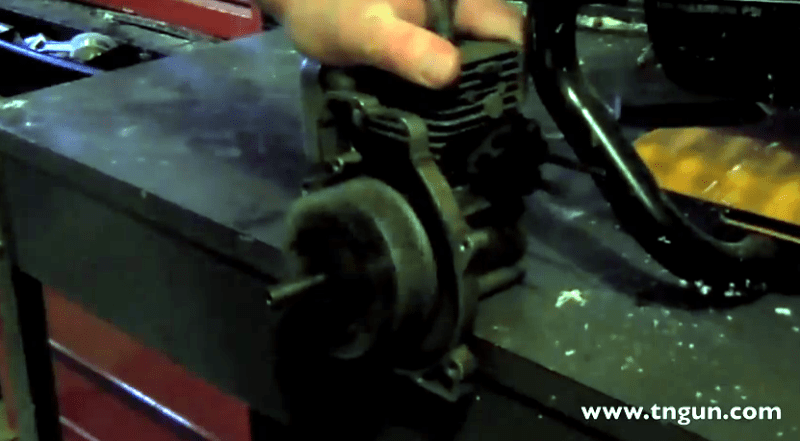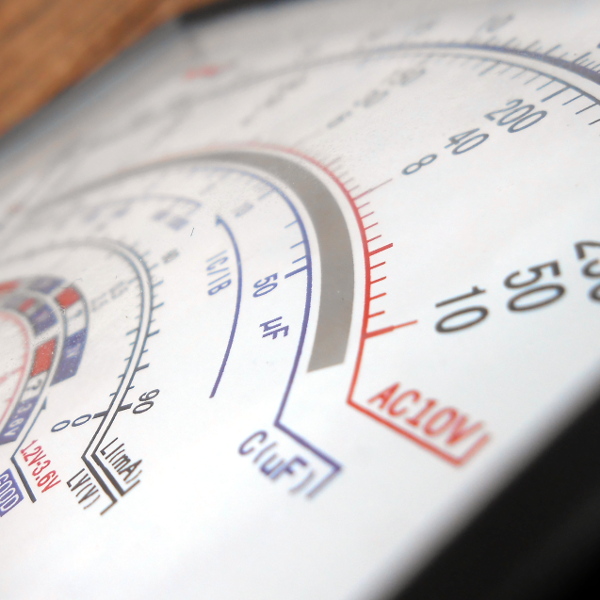We had no idea that what’s needed to convert an internal combustion engine to steam power is actually rather trivial. [David Nash] shows us how it’s done by performing the alterations on the engine of a string trimmer. These are the tools used to cut down vegetation around obstacles in your yard. The source of the engine doesn’t really matter as long as it’s a 2-cycle motor.
This engine had one spark plug which is threaded into the top of the block. [David] removed this and attached his replacement hardware. For now he’s using compressed air for development, but will connected the final version to a boiler.
There are only a couple of important parts between the engine and the boiler. There’s an in-line oil reservoir to help combat the corrosive nature of the steam. There is also a check valve. In the video after the break [David] shows the hunk of a ball-point pen that he uses to actuate the check valve. It’s really just a spacer that the piston pushes up to open the valve. This will be replaced with a metal rod in the final version.

















With this knowledge we can convert the Chevy Impala to run on steam….
I admire your ambition but I think you might have trouble finding an Impala with a 2-cycle engine. :)
Technically the Impala does have a 2-cycle engine. Seeing how a cycle is 360º then a cycle would consist of 2 strokes. So 2 cycles therefore is 4 strokes, which all modern car engines are. Now what I htink ythey article (and yourself) means is you’d be hard pressed to find an Impala with a 2-STROKE engine :)
Technically there’s no reasons that this couldn’t be done on a 4-cycle engine, as long as the spark plug was in line with the piston so the pushrod method could be used.
You’d just adjust the timing of one of the camshafts so that the exhaust valves open on one of the upstrokes (like normal) and the inlet valves open on the other upstroke (instead of on a downstroke).
That way steam would be injected at every top dead center, and at least one set of valves would be open on every upstroke.
Like Joe said modern car engines are 4 stroke, but most mopeds and some old motorcycles are 2 stroke, so when the Zombie Apocalypse comes you can get away on a steam powered moped!
As long as you have a head of steam when they come at you.
Hold on Zombies let me light my boiler and heat the water to make steam ( about 20 min ) so i can escape , \
Adding a large pulley to small pulley combo for operating the air supply could potentially make it a self powered air engine. Pressure tank, relief valve and car alternator ( on the pulley ) and pull start ( several pulls to get it going or porta-tank to prime the main reservoir ) could potentially mean portable air power.
By no means am I saying Steam is dead, I’m saying since it does work with air, why not get it going farther on just air. The government can’t charge for compressed air in most countries.
Either way, impressive work so far including FINDING the check valve!
That will never work. You can’t use an engine to power a compressor to power the engine.
no it will not run, no it will not extend the range. if anything it will take away efficiency and make it use more energy.
yep, just like my dad says about turbo chargers… Wait, he tells me to keep an eye on the ratio due to pumping in too much air….
So, ya get a really small pully for the pump, big on the engine and see what happens when ya start with a porta tank at half full.
Turbos work because there’s an overflow of energy in the exhaust stream that comes from the gasoline you put in the engine. The engine leaks 4/5ths of the energy in the gasoline out of the tailpipe, so there’s plenty of power left in the exhaust flow to turn a compressor.
ugh, thank you dax. yes. exhaust air is full of *super hot air* that’s the difference. and 2! a turbocharger doesn’t run itself. why the hell would i waste all the time attaching an engine to a turbocharger if i could just attach the compressor output to the turbine input? because there’s no energy to extract! why waste your time with perpetual motion when you have plenty of energy around you. i’d rather make efficient use of the shit-ton of energy we have around us than waste time with that.
but cmon, the wood in your backpack and the boiler on the back would say steampunk like nothing else ever could.
I wonder if this can be easly done to the 800 watt Harbor Freight generator that is usually on sale for less then $100?
I have wondered that also. I believe it would, but I end up with too many projects in the works to go buy one just to cut open…
You’re better off running that generator directly on wood gas (google it, you’ll see people doing this) rather than spend all the energy to make steam then run the engine.
I like the idea, but with steam running through it I don’t believe this engine will make it long. Even with a good air dryer to stop the moisture, there won’t be any oil. Crankshaft bearings go real quick with no oil
Now I’m really curious.
An air dryer in a steam engine?
Can you explain how that will work?
there are steam dryers, wet steam damages engines, breaks things…. now if a air dryer would hold up to the heat, or even work is questionable.
Maybe skip the steam and air dryer and go straight to a hair dryer.
Power plants use “superheated” or dry steam so that there’s no liquid water going into the turbine. Water vapor (steam) won’t corrode like condensation will. So keep the engine hot and the steam dry and you’ll get decent life out of the engine.
Could you not run ordinary wet stem through a loose filter to rid it of the wetness
Dry steam is water gas, wet steam is liquid water suspended as droplets in water gas or air. Wet steam is what you see coming out of a kettle, and dry steam is what you don’t see coming out of a kettle.
Nice and simple idea but I do have some daubt about long time reliability and efficiency.
Also note that compressed air has been used for ages (Well almost) for starting the engines of ships.
I probably will not, but since weedeaters are cheap, and are considered disposable by most, people just end up giving them too me. Once I get everything just right, I am planning on casting a more durable system, but it will be a long time before I get around to it.
clever,
I did did the same with a 2 cycle lawn boy mower motor and a electric solenoid connected the the spark plug hole. The points controlled the electric valve that controlled the steam. Had to re-grind the cam profile to get right open – closing of the points tho’
A 2 stroke with a cam??
the cam that activates the points , runs at crank shaft speed.
You mean the distributor?
Single cylinder engine does not have a distributor.
probably for the magneto
If you want to do this with a 4 stroke engine all you have to do is change the valve timing to 1:1.
When Herr Otto “invented” his engine he took existing steam tech and modified it.
I’ve asked a few mechanics and automotive engineers about this.
Large diesel engines are 2 stroke, with valves.
Biggest issue with doing this is that the parts used in combustion engines are designed to handle much higher internal pressures than steam, the result is the parts are much harder to move and you lose a lot of energy in just moving the heavier parts.
instead of the whole valve setup you could just use a rubber hose between the air hose and where you connect it to the engine
oil in a small 2-stroke is an issue, then there is ultimately the boiler which is unsafe with a difficult to regulate wood fire. What is on my list for off grid power is big bone listers on WVO or hit and miss on methane or woodgas. Plenty of HaD fodder in the digester, centrifuge, high amp multiphase charger regulators, permanent magnet generators, alternator fields, starters, heat recycling…
The valve opened by the piston is technically a “bash valve” not a check valve (although, in a different situation, it would also tend to operate as the latter).
BTW, this is the same system used in the “Air Hogs” planes/helicopters (before they abandoned air power and became yet another R/C toy maker). There are some interesting videos on YT of people running these small, plastic versions on CO2 (dry ice heated with water). It would be cool (pun intended) to see how long a converted weed-whacker engine would run on a given mass of dry ice. Of course, other sources of CO2 would likely be of interest, as well…
Buddy n i did something like this aaaaaages ago with a 4-stroke bike motor. Its much simpler with a 4 stroke in my opinion… just need to double-up on the lobes of the cam shaft
[youtube http://www.youtube.com/watch?v=BOAQoYdGxVg?feature=player_detailpage&w=640&h=360%5D
Nothing new at all. Model airplane nuts have been using this concept since the 1930s. I have a couple that run on CO2 cartridges.
Steam will destroy the bottom end of that engine in a couple of heartbeats, too. Not to mention the rings.
nybbler905
“The government can’t charge for compressed air in most countries.”
Yet!
The government can charge for the petroleum and electricity to run the air compressors though.
Running things on compressed air is pretty stupid though, unless the system is big and slow enough to run isothermally, because otherwise you lose about 90% of your energy as heat.
Old railway locomotives that ran on compressed air still used a small coal fire to heat the gas coming out of the air tank, because the expanding gas cools down and the engine loses pressure. Other designs used heat exchangers and blowers to take in ambient heat, but that loses power into running the blowers.
yep, the electric car can’t be done at a reasonable speed/battery power.. just ask anyone working at Tesla motors and don’t forget how SLOW an electric car is….
0 to 60 mph 3.9 seconds
http://www.teslamotors.com/roadster/specs
and you can’t run a car on compressed air…
http://www.flixxy.com/zero-pollution-automobile.htm
I’ve ridden in tesla’s latest. It was a freaking beast.
Would using ISO 460 oil help, or would that damage the engine?? http://www.southernsteamtrains.com/notes/steam%20oil.htm
This make me want to try and make a aeolipile magna generator., or a gasifier to run a generator..I think they made basic gasifier kits to run cars in Europe during ww2 since gas was rationed..
you know it would work with a 4 stroke engine, just use the built in valves. remove the fuel injectors, seal the holes left behind and have some sort of blow off valves where the spark plugs used to be. to avoid having it compress the steam after it expanding. easy to do with electronic timing if you have a cam shaft sensor.
Surly the steam or air would be best going in the fuel intake port or valve ? With the timing adjusted maybe.
Steam power great if you have large supply of fuel to burn cheap of free, as take it that this is the point of this exercise cheaper or free power ?
As to lubricantion how was the steam engine done, check this out and back engineer into your build.
Or why not buy a steam engine there’s lots around, and run your generators etc off it.
That valve on the film is a water none return valve as fitted to basins, baths, and outside taps, just a ball in a cage, you could make one with a bit of pipe, a washer, and ball bearing, mig welder, etc.
And you can buy all the bits to make a steam engine.
But great little film.
There are videos out there to make a boiler run on solar power. You use an old satellite dish, the big one, and change the punched metal to polished aluminum or stainless steel for the reflector. The focal point is already there and if you get one w/ the motorized sat. changing apparatus installed you can use a GPS to have it track the sun.
So it’s a ready made version of this: http://www.animatedengines.com/co2.html
An old brake drum could be made into a flywheel.
Power it with this device
https://www.youtube.com/watch?v=iJCfsqvEx1w&t=266s
You can do it with the 150 degree C model or the 250 to 300
degree C but I would use a heat exchanger of old used oil to water
and running that hot with good storage you could do what is called
flash steam, that is if I understand that term right. The think is with
this set up pick up a used Prius and take the Motor-Generator out
and run your house’s electric with it if you have the space to set up the
solar heater on the east to west bearing. Saves on have to chase the sun
across the sky just do a weekly elevation adjustment.